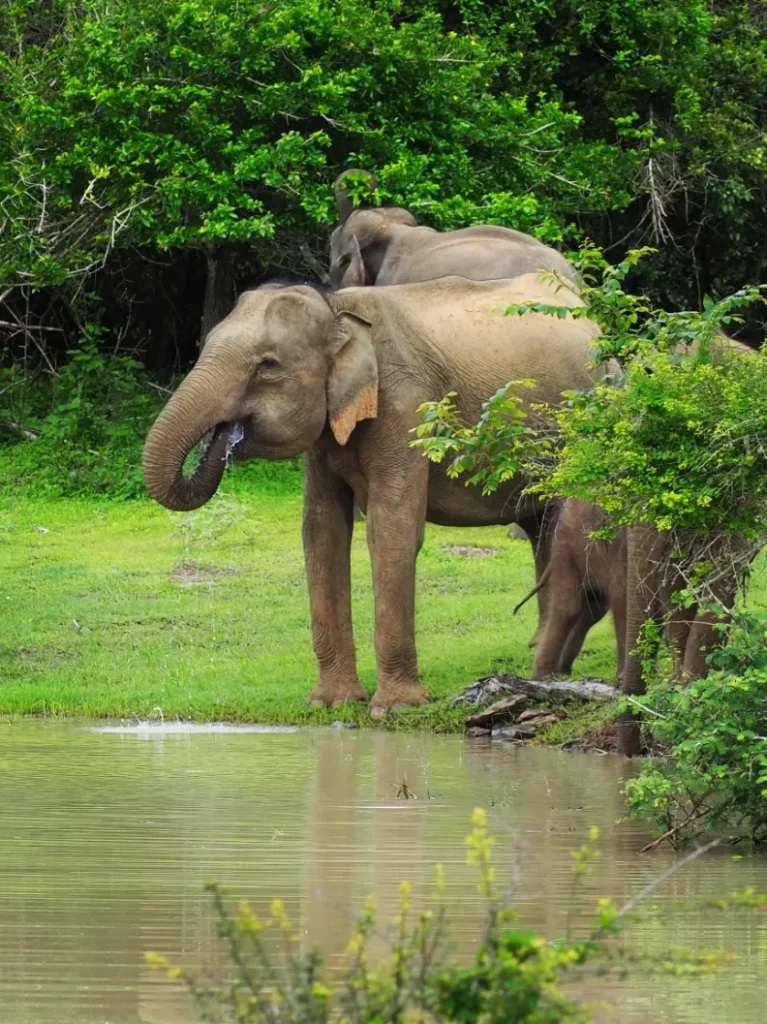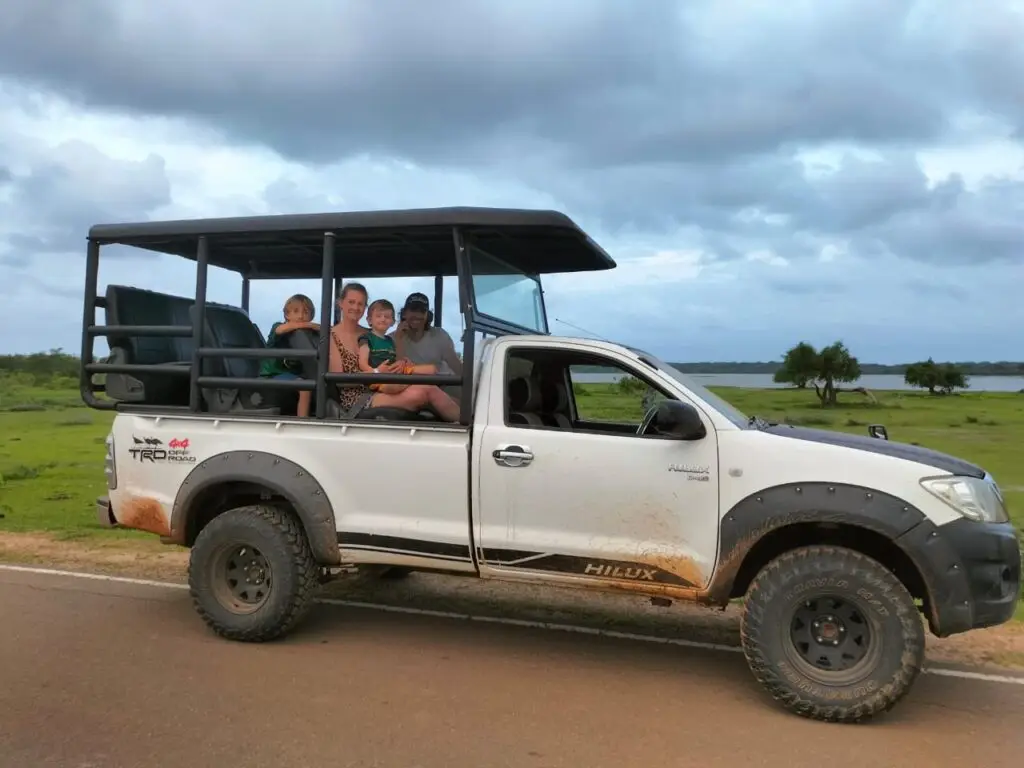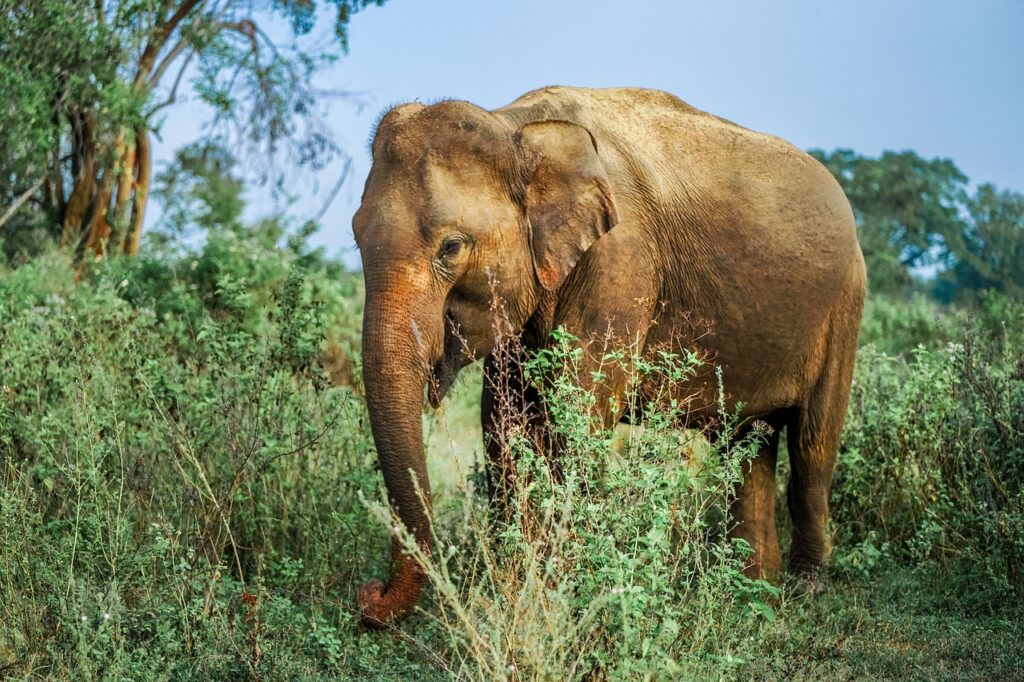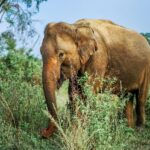Introduction to Udawalawe National Park
Udawalawe National Park, situated in the southeastern part of Sri Lanka, is a critical wildlife sanctuary renowned for its impressive array of flora and fauna. Covering an extensive area of approximately 30,821 hectares, this national park is not only a haven for wildlife enthusiasts but also plays a significant role in the conservation of the region’s biodiversity. Established in 1972, the park was initially created to provide a sanctuary for wild animals displaced by the construction of the Udawalawe safari Reservoir, thereby solidifying its importance as a refuge for various species.
This park is predominantly recognized for its substantial population of Asian elephants, which roam freely across its vast grasslands and shrub forests. Visitors engaging in an Udawalawe safari are often mesmerized by the sight of these magnificent creatures in their natural habitat. The park’s unique ecosystems further enhance its appeal, showcasing a combination of open plains, wetlands, and dense forests, which are home to a plethora of wildlife including water buffalo, sambar deer, and an array of bird species, making it a paradise for bird watchers as well.
Moreover, Udawalawe National Park holds considerable significance for both conservation efforts and the tourism sector in Sri Lanka. It serves as an essential breeding ground for certain endangered species and actively engages in ecological preservation efforts. The park’s accessibility and well-maintained road infrastructure also make it a popular destination for both local and international tourists. By participating in an Udawalawe safari, visitors not only witness the breathtaking beauty of Sri Lanka’s wildlife but also support vital conservation initiatives that protect these animals and their habitats. Overall, Udawalawe National Park is an indispensable part of Sri Lanka’s natural heritage, with a commitment to enduring ecological balance and responsible tourism.
Best Time to Visit Udawalawe safari
Choosing the optimal time for an Udawalawe safari is crucial for maximizing the experience. Udawalawe National Park showcases vibrant wildlife, particularly elephants, but the factors influencing wildlife activity and visitor comfort should be evaluated. Generally, the dry season, which spans from May to September, is considered the best time to visit the park. During this period, water sources become scarce, prompting elephants to congregate near the remaining waterholes, making them highly visible to visitors.
In contrast, the wet season from October to April offers a different experience. While the park remains lush and beautiful, animals can be more dispersed, making wildlife spotting a bit more challenging. Nonetheless, the months from December to March present a unique opportunity, as the post-monsoon landscape flourishes and migratory birds arrive, adding a vibrant touch to the safari experience. These months can be particularly rewarding for birdwatchers.
Peak tourist seasons usually align with school holidays and local festivities, causing a surge in visitors. This influx can lead to crowded safari excursions, potentially affecting the overall experience. To enjoy a quieter visit, consider planning your trip during the shoulder months, particularly in late April or early May, just before the peak dry season hits. This timing not only allows for fewer crowds but also provides a better chance of seeing various species as they are more active before the severe heat sets in.
In conclusion, for an unparalleled Udawalawe safari, aim for the dry season while being mindful of local tourism patterns. Understanding the seasonal behaviors of elephants and other wildlife will significantly enhance the enjoyment of the Udawalawe safari, ensuring a memorable encounter with Sri Lanka’s elephant paradise.
Getting to Udawalawe safari
Reaching Udawalawe safari, an essential destination for those interested in an enthralling udawalawe safari, can be accomplished through various modes of transportation. The choice of transit method often depends on your starting location and personal preferences. If you are coming from Colombo, you can opt for a private car or taxi, which provides a comfortable and convenient journey. The distance from Colombo to Udawalawe safari is approximately 150 kilometers, and the travel time usually ranges from four to five hours, depending on traffic conditions.
Public transportation is another viable option. Buses regularly depart from the Colombo Central Bus Stand to the town of Embilipitiya, which is the nearest town to Udawalawe. From Embilipitiya, you can hire a tuk-tuk or a taxi to reach the Udawalawe safari park’s entrance. The bus journey typically takes around five to six hours, depending on the route and any stops along the way. This alternative allows for a budget-friendly travel experience, although it may be less direct and comfortable compared to private transport.
For travelers starting their journey from Ella, a popular hill country destination, the trip to Udawalawe can be broken down into segments. Generally, you would take a bus or hire a taxi from Ella to Haputale and then proceed to Wellawaya. From Wellawaya, you can catch a bus or use a taxi to reach Udawalawe National Park, which will take approximately two to three hours in total. This scenic route not only provides the thrill of an exciting udawalawe safari experience but also showcases some of Sri Lanka’s breathtaking landscapes.
For added convenience, many local tour operators offer guided journeys that include transportation, park entry fees, and curated safari experiences. Booking these tours in advance through reliable agencies can make for a more seamless travel experience, ensuring you maximize your time at this stunning national park.
Safari Options at Udawalawe safari
Udawalawe National Park, renowned for its abundant elephant population, offers various safari experiences designed to cater to diverse preferences and budgets. The most popular option is the private jeep safari, which provides a tailored experience for individuals, families, or small groups. This choice allows for flexibility in terms of timing and route, ensuring visitors can maximize their wildlife encounters. Private safaris typically last around three to four hours, providing ample opportunity to spot elephants, water buffalo, and myriad bird species at a comfortable pace.
For those seeking a more social experience, group tours can be an excellent alternative. These safaris combine multiple visitors into one jeep, often reducing the cost compared to a private safari. While this option promotes interaction and shared experiences, it may limit the time spent at particular sightings, as the group must adhere to a set schedule. Group tours are generally well-organized, with experienced guides who can provide insight into the park’s diverse flora and fauna, making them ideal for budget-conscious travelers.
For a unique perspective, walking Udawalawe safari offer an intimate experience of Udawalawe safari natural beauty. Led by trained guides, these excursions allow visitors to explore the park on foot, emphasizing the ecosystems and smaller wildlife often overlooked during jeep safaris. However, walking safaris may not guarantee the same level of wildlife visibility as vehicle tours, and participants must adhere to safety protocols due to the presence of wild animals.
Ultimately, the choice of safari option at Udawalawe depends on one’s preferences, whether seeking privacy, budget considerations, or immersive exploration. Each experience presents an opportunity to appreciate the breathtaking wildlife of this Sri Lankan gem, ensuring unforgettable memories for all who enter its bounds.
What to Expect on Your Udawalawe safari
Embarking on an Udawalawe safari offers an immersive experience into the stunning wildlife habitat of Sri Lanka, showcasing the island’s rich biodiversity. Upon arrival, visitors can anticipate a well-structured itinerary that typically begins with an early morning drive or an afternoon outing, optimizing chances to observe various species during their most active times. The Udawalawe National Park spans over 30,000 hectares and is renowned for its large population of elephants, making them the centerpiece of many safari experiences.
During the safari, participants can expect to witness elephants roaming freely, often in herds, as they traverse the park’s diverse landscapes. Besides elephants, the park is home to numerous other wildlife species. Look out for the Sri Lankan water buffalo, often seen wading in water bodies, as well as crocodiles basking on the shores. The park also serves as a sanctuary for multiple bird species, such as the painted stork, lesser adjutant, and various migratory birds, making it a birdwatcher’s paradise.
Wildlife behavior can be fascinating to observe during your visit Udawalawe safari. Elephants, for example, display complex social structures and a range of behaviors, including bathing, playing, and feeding. This provides a unique opportunity for photographers to capture candid moments, highlighting the raw beauty of nature. When planning your photography, it’s advisable to maintain a respectful distance from the animals, allowing them to engage in their natural activities without disturbance. Additionally, using a zoom lens helps to capture high-quality images while prioritizing the safety and comfort of both the visitors and wildlife.
To enhance your experience and contribute to sustainable practices, familiarize yourself with the park’s regulations and etiquette, ensuring a respectful observation of the wildlife. Your Udawalawe safari will undoubtedly provide unforgettable memories of both the majestic elephants and the diverse flora and fauna that thrive within this beautiful national park.
Where to Stay Near Udawalawe safari
When planning a trip to Udawalawe National Park, selecting the right accommodation can significantly enhance your safari experience. The region offers a variety of lodging options that cater to different preferences and budgets, ensuring every visitor can find a suitable place to rest after a day of exploring the wildlife.
For those seeking luxury, a selection of premium lodges is available just a stone’s throw from the park entrance. These establishments often provide spacious rooms with stunning views of the surrounding wilderness, along with personalized service, exquisite dining, and unique safari experiences. Many top-rated lodges offer guided tours led by experienced naturalists, giving guests an in-depth understanding of the park’s ecosystem. Popular choices include the eco-luxurious Mahoora Tented Safari Camp and the upscale Elephant Reach Hotel, both known for their exceptional amenities and outstanding guest reviews.
For travelers inclined toward eco-friendly options, several hotels in the vicinity prioritize sustainable practices. These accommodations, such as the Eco Lodge Udawalawe, feature environmentally conscious designs and contribute to local conservation efforts. Staying at these lodges not only provides comfort but also aligns guests’ values with responsible tourism. Each eco-lodge embraces local culture and often organizes nature walks and cultural experiences, adding depth to the typical udawalawe safari adventure.
Budget travelers will find an array of affordable hostels and guesthouses that do not compromise on comfort. These options, such as the Udawalawe Homestay, provide clean and simple accommodation at reasonable rates, allowing visitors to allocate more of their budget towards park activities and guided safaris. Guest reviews often highlight the friendly hosts and their willingness to provide valuable insights about the park and surrounding area.
In summary, with its diverse range of accommodation options catering to various preferences, visitors can find the perfect place to stay near Udawalawe National Park, ensuring an unforgettable safari experience. From luxurious stays to budget-friendly hostels, the region provides something for everyone. This variety allows travelers to tailor their udawalawe safari experience in a way that best suits their needs and interests.
Sustainable Tourism Practices
Sustainable tourism is increasingly essential in the realm of wildlife tourism, especially in destinations like Udawalawe National Park, home to a rich diversity of flora and fauna, particularly its renowned elephant population. As visitors flock to experience the udawalawe safari, it is crucial that they adopt practices that minimize their ecological footprint and promote the conservation of this remarkable ecosystem.
One of the primary ways travelers can contribute to sustainability is through responsible wildlife viewing. Maintaining a respectful distance from animals and minimizing noise ensures that the natural behaviors of wildlife are not disrupted. Tourists should refrain from feeding or provoking animals, as this can lead to altered behaviors and dependency on human-provided food sources. Educating oneself about the local wildlife and understanding their natural habitats enhances the safari experience while fostering a sense of respect for the creatures encountered.
Moreover, reducing the ecological impact during a visit can be achieved through several mindful actions. Opting for eco-friendly accommodation is vital; many lodges near Udawalawe National Park promote sustainable practices, such as using renewable energy sources, conserving water, and limiting waste. Similarly, selecting tour operators that are committed to sustainable principles ensures that the experiences offered do not detrimentally affect the environment. These operators often engage in conservation efforts and support local communities, which adds a layer of benefits to the tourism experience.
Lastly, supporting local communities through ethical engagement can amplify the positive effects of a udawalawe safari. Tourists can participate in local craft markets or support community-led initiatives, which in turn enhances the economic stability of these regions while promoting conservation. By adopting these sustainable tourism practices, visitors play a vital role in preserving Udawalawe National Park for future generations of both wildlife and travelers alike.
Cultural Experiences Around Udawalawe
Visiting the Udawalawe Safari is not only about witnessing the majestic elephants that inhabit the national park; it is also an opportunity to immerse oneself in the rich cultural tapestry of Sri Lanka. Surrounding Udawalawe, local villages offer an authentic glimpse into the daily lives of the communities that have thrived in harmony with nature. Engaging with these villages allows visitors to appreciate the traditions and practices that shape this vibrant region.
One of the key cultural experiences is the opportunity to participate in traditional crafts. Local artisans often welcome tourists to try their hand at handicrafts such as pottery, weaving, and batik. This not only provides insight into the skills passed down through generations but also supports local economies. Engaging in these activities fosters a deeper connection to the craft and the culture, enriching the overall Udawalawe safari experience.
Moreover, the culinary offerings in the area are a delectable aspect of the cultural experience. Visitors can explore local cuisine through cooking classes or food tours that highlight regional flavors and cooking techniques. Signature dishes such as rice and curry, hoppers, and traditional sweets are not just meals but a reflection of the history and practices of the people. Engaging in culinary traditions allows visitors to savor the essence of Sri Lankan culture beyond the sight of its wildlife.
Additionally, cultural festivals often take place throughout the year, showcasing traditional music, dance, and rituals. Participating in these events provides a unique opportunity to witness the local celebrations that bring communities together. Through interaction with the locals, tourists can gain a valuable understanding of their customs, storytelling, and the importance of wildlife conservation in their culture. Such experiences elevate a Udawalawe safari from a mere wildlife expedition to a profound journey into the heart of Sri Lanka.
Tips for a Memorable Safari Experience
Embarking on a Udawalawe safari offers a unique opportunity to immerse oneself in the rich biodiversity of Sri Lanka, especially renowned for its elephant populations. To ensure a memorable experience, preparing adequately is essential. Start with packing essentials; lightweight, breathable clothing in earthy tones is recommended, as it blends well with the surroundings, making wildlife sightings more likely. A good pair of binoculars can enhance your ability to observe distant animals, while a camera with a zoom lens is vital for capturing those unforgettable moments without disturbing the wildlife.
Health and safety should also be a priority. When planning your Udawalawe safari, it is wise to carry sunscreen and insect repellent, as prolonged exposure to the sun and insects can detract from the joy of the experience. Staying hydrated is essential; pack reusable water bottles to minimize environmental impact. Furthermore, ensure you have any necessary vaccinations or preventative medications, particularly if you are traveling from abroad.
Etiquette during your safari is crucial for both guests and wildlife. Maintain a respectful distance from animals, as getting too close can cause stress to them and provoke dangerous encounters. It’s advisable not to feed animals, as this can alter their natural behavior and lead to health issues. Additionally, keeping noise to a minimum will enhance your experience, allowing you to fully appreciate the sounds and sights of nature.
Finally, while documenting your Udawalawe safari experience, consider the impact of using flash photography on wildlife. Aim to take photos in natural light and use stable shooting techniques to avoid blurry images. With these tips in mind, you are well-prepared to embrace the wilderness and partake in the unforgettable adventures that Udawalawe has to offer.





















